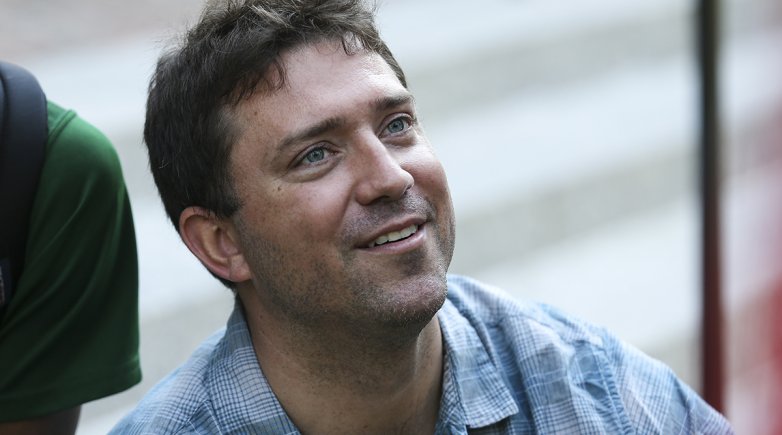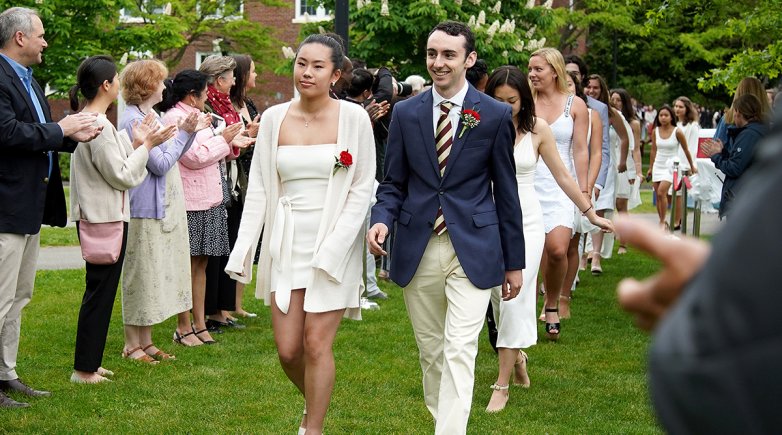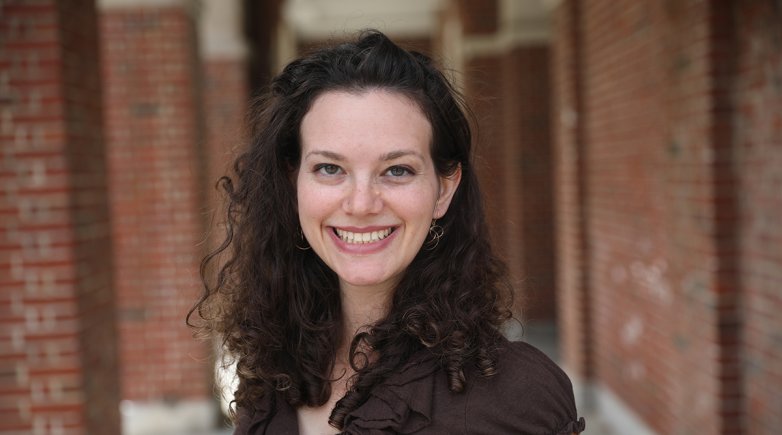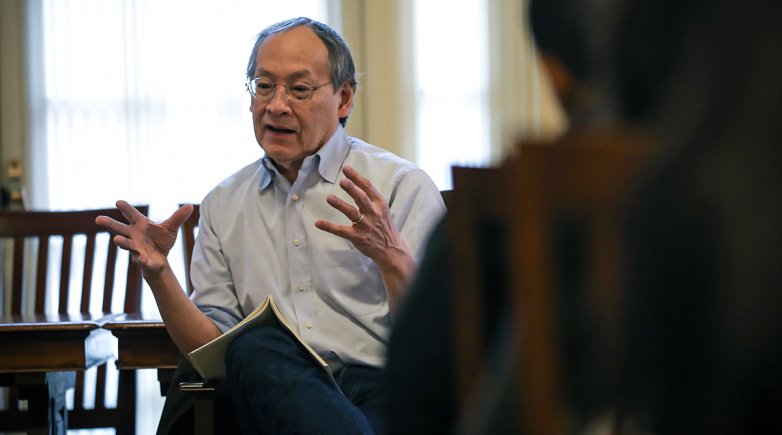Into place
English Instructor Jason BreMiller writes about this "virtual" existence robs us of our connection to the natural world.
I’m homebound under the governor of New Hampshire’s Stay-at-Home order, and my kids are ping-ponging off the walls in the adjacent room. Something about He hit me first and the whack against flesh of the foam roller they’ve dubbed the “Monster Bonker.” It’s the opening week of spring term, but instead of gathering with my students around the Harkness table, or heading with them into the field, I’m planted here in McConnell Hall with my wife and kids, trying to juggle full-time teaching and parenting my small children. Maybe it’s because I’ve just binged “The Tiger King,” but I’m starting to see bars on the windows.
In truth, I’m grieving the loss of my usual shtick, of the time outdoors with my senior English elective Literature and the Land class, which grounds me in the rhythms of the season. As if to drive this loss home, my mind is chock-full of newly acquired e-learning jargon; rather than contemplating the Squamscott River ice breakup or the alewife migration on the Exeter River, I’m thinking about Zoom and modules and touchpoints and asynchronicity. The words taste like hand sanitizer. I’ve been staring at the screen for so long, I feel like I might fall in.
Legendary English Instructor Peter Greer taught Lit and the Land for many years, and it’s now one of the longest-running secondary school environmental humanities courses in the country. I met Peter only once, when he took me to lunch to discuss his course and to pass along boxes of material he’d accumulated from teaching it since the late 1980s. I’ve always felt grateful for that conversation, for even a moment with this brilliant, deep-hearted man who fiercely loved the earth and his students. Peter died the following week. I hadn’t even known he was sick.
In the course’s design, I’ve tried to honor the connection to Peter and to the past. So, like Peter’s course, the current iteration involves weekly “walks.” We visit Apple Annie, the apple farm of former PEA English Instructor Charlie Pratt and his wife, Joanie, and Amy Robinson’s apiary, places Peter routinely took his classes. We talk about Donald Culross Peattie’s “slow turn of the seasons,” which Peter used as a frame to urge his students to watch closely for spring’s onset — worm castings in the lawn, or the arrival of redwing blackbirds and bobolinks. I think it would please Peter to know Lit and the Land’s pith is still this: fostering in our students an awareness of and connection to place.
Reading my notes from this date last year, I lean a bit deeper into my grief over what is lost:
Yesterday, I took my Lit and the Land students into the field for an early morning observation at Colby Farm. A brisk morning with skims of ice sheathing wheelrut puddles and a stiff western breeze gusting across snow matted hay. I cringe at what some of the kids show up wearing, sockless in sneakers, sweatshirts sans coats. Nary a hat or mitten to be seen despite my best attempts to ensure their preparation. But we head out anyway because it’ll be an hour or less, so the stakes are low, and besides, there’s poignancy in discomfort, a sharpening.
It’s a brilliant morning, full of myriad spontaneous discoveries. A tree gone silver in the sun across the fields. Grackles golden in the slanting light. The shock of warmth as we tep from the hemlock shadows into the field’s open sun. The infinitesimal moment when a male bluebird glows iridescent. We kneel in the dirt together picking apart an owl pellet, deducing by a solitary blunted nail the species it contained. A rabbit. We squat by small impressions in the mud, in the duff, fingering their contours and asking questions: What animal is this? What direction did she walk? Where was he going? Deer. Coyote. Turkey. We see them all. Peeling back strips of birch from a downed limb, we notice the pink layers, each finer and finer until you can barely feel anything at all against your fingertips. ... We stumble across a porcupine tree, hollow at the bot-tom, scat piled high, identified by an astute student willing to get close enough to kneel in the scat and pick up the quills left as signposts. And we find a garter snake, the season’s first, torpid, sunning itself warm in the oak leaves. As a tribute to the snake or to Ed Abbey himself, whom we’ve read, Vinny acts out a passage from Desert Solitaire, dropping to his belly as his classmates chuckle and squirm, nosing his way forward until he’s eyeball to eyeball with the snake:
Like a living caduceus they wind and unwind about each other in undulant, graceful, perpetual motion, moving slowly across a dome of sandstone. ... A shameless voyeur, I stare at the lovers, and then to get a closer view run outside and around the trailer to the back. There I get down on hands and knees and creep toward the dancing snakes, not wanting to frighten or disturb them. I crawl to within six feet of them and stop, flat on my belly, watching from the snake’s-eye level...
In our next class, we follow the river trail and arrange our Crazy Creeks in a makeshift Harkness table within a hemlock grove where I listen to the students speak with awe about yesterday’s hour in the woods. They name the details they encountered, and their sense of wonder is palpable. At first, they differentiate these moments from their experiences in science class (measure! record! quantify!), but slowly they circle back to the proximity between these epistemologies, how they are linked, maybe even wedded. Toby invokes Annie Dillard and her practice of lowering her threshold for what inspires wonder, thereby increasing the frequency of one’s possible encounters with wonder.
Hannah says, “It all makes me think about what unites us,” and Grace follows, “I hadn’t felt that peaceful in years.” As we let these words linger, we listen to the breeze soughing through the canopy.
Do you understand now what I mean when I speak of grief and loss? How can I re-create all this from afar, from behind the screen’s digital eye? How can any of us replicate the magic that happens when we gather around the table, indoors or out? I’ve tried to design opportunities for my students to connect to the natural world wherever they might be, in their own places, even if that means necessarily observing that world from behind a pane of glass.
The truth is this spring will be different. If there’s one thing I’ve learned, though, from almost two decades of leading students outside, it’s that the natural world works itself on them no matter the constraints. I think of Wordsworth’s “The Tables Turned”:
Come forth into the light of things, Let Nature be your teacher.
Get out of the way and let it happen has long been my teaching mantra, and right now, it’s what gives me hope. That maybe, in the midst of loss, this strange time might also contain possibilities we don’t yet see. That remote learning — maybe the pandemic itself — could be a doorway to deeper compassion for people and places unimaginable to us now.
On our yearly visit to Apple Annie we wander the orchard, the May bloom a lovely cloud of pink about us, and listen to Laurie Loosigian speak with love about the challenges and rewards of working an orchard. Laurie and her husband, Wayne, took over the orchard from Charlie and Joanie Pratt after apprenticing with them for five seasons. The bloom arrives earlier each year, Laurie says, and the battle against pests is a losing fight. Such is the plight of an orchardist in the Anthropocene. As if to prove her point, she squeezes a green pug between her fingernails, that destructive little bud-eater. “Take that!” But the students caress the joint where Wayne and Laurie’s daughter Emma, who took Literature and the Land from Peter Greer and who will take over Apple Annie’s from her parents, grafted new fruit onto an old limb, binding the joints and rubbing them with salve. Joanie joins us, too, and before we head into the barn to devour the treats Laurie, Wayne and Emma have baked for us, we gather around Charlie’s rock and read aloud his poem “Into Place.” Our voices waver at first, then steady, joining the chorus of love that has come before, and that continues now.
“Into Place,” by Charlie Pratt
It’s not so much a departure as an
arrival,
Or rather, a having arrived — as
when, out driving,
You pass an orchard on a southward
hill,
Old apple trees aslant in heaps of
prunings.
For sale. What do you know of
apples? Still,
One morning you wake up under a
different ceiling.
And feeling that you’ve not chosen
but been chosen,
Are something less than owner,
more than guest.
You fertilize and mow, attend the
slow
Growth of apples readying for
harvest,
And settle into place like leaves or
snow,
Unfold like a letter delivered as
addressed.
Editor’s Note: Jason BreMiller is an English instructor and the Academy’s sustainability education coordinator. He is also director of the Exeter Environmental Literature Institute.
This article first appeared in the spring 2020 issue of The Exeter Bulletin.



